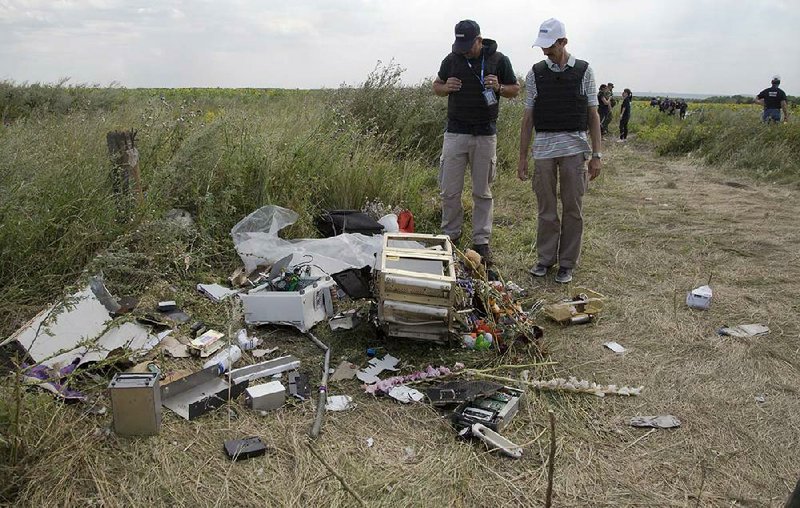KIEV, Ukraine -- Ukraine and Russia traded accusations of cross-border shelling Friday as the U.S. said Russia has moved 12,000 troops onto the frontier and there are signs it's planning to supply heavier weapons to rebels in eastern Ukraine.
A Ukrainian border checkpoint at Marynivka in the Donetsk region "was attacked from Russian territory by mortars, Grad missile systems and artillery" twice Thursday evening, damaging infrastructure and equipment, a Defense Ministry spokesman, Andriy Lysenko, said Friday in Kiev.
Russia's Rossiya 24 state television said about 40 artillery shells landed in Russia's Rostov region from across the border and one woman may have been hurt. It showed images of unexploded shells near a border post.
The U.S. State Department raised the allegations of Russian cross-border fire Thursday, marking the first time American officials have publicly alleged direct Russian participation in fighting on behalf of the separatists.
Russia rejected those accusations Friday, with the Foreign Ministry saying in a statement that no evidence was provided to support the "false" claims because "it simply doesn't exist."
The U.S. also said Friday that it had indications the Russians intended to move large-caliber weapons to the separatists in eastern Ukraine.
Deliveries of arms such as multiple-launch rocket systems are "imminent" as part of a "continuing flow" of weapons to the pro-Russia rebels, Defense Department spokesman Steve Warren said, noting that the number of Russian troops has risen to 12,000 from about 10,000.
The Defense Ministry in Moscow couldn't immediately be reached for comment.
The July 17 downing of Malaysia Air Flight 17 over eastern Ukraine, killing 298 passengers and crew, has dashed at least temporarily any chances of de-escalating the struggle between the rebels and the government. Russian President Vladimir Putin is facing pressure to expedite the probe into the crash, which the U.S. says was probably caused by a Russian-supplied missile.
As tensions rose, the European Union on Friday extended its Ukraine-related sanctions to target top Russian intelligence officials and leaders of the rebels in eastern Ukraine, official documents showed.
Among the 15 new people subjected to an EU-wide asset freeze and travel ban were Alexander Bortnikov, head of the Russian Federal Security Service, and Sergei Beseda, head of the service's department that oversees international operations and intelligence activity. Four members of Russia's Security Council were also included on the EU list.
The new measures, designed to put pressure on Moscow and its allies in Ukraine, were announced in the EU's Official Journal and took effect immediately. Eighteen organizations or businesses, including rebel formations in Ukraine's east, were added to the trade bloc's sanctions list at the same time.
The action brought the total number of people under EU sanction in connection with Russia's annexation of Crimea and the revolt in eastern Ukraine to 87. Two Crimea-based energy businesses had already had their EU holdings frozen.
Russia's central bank unexpectedly increased borrowing costs Friday for a third time this year, and the ruble traded weaker against the dollar.
"There's ample evidence" that sanctions imposed on Russia by the U.S. and the EU "are having an economic effect," White House press secretary Josh Earnest said.
In Kiev, Ukrainian President Petro Poroshenko called a special session of parliament for Thursday. The move, announced late Friday on the president's website, came after the collapse of the ruling coalition and the resignation Thursday of Prime Minister Arseniy Yatsenyuk.
Lawmakers had gone into a recess after failing to pass two government-proposed bills, including one on funding the military and cutting social spending required under Ukraine's $17 billion International Monetary Fund aid deal.
International Monetary Fund Managing Director Christine Lagarde spoke to Poroshenko and Yatsenyuk on Friday to encourage "steady implementation" of the IMF program, the fund said in a statement.
Also Friday, Ukrainian Foreign Minister Pavlo Klimkin and his Australian counterpart, Julia Bishop, signed an agreement to deploy armed Australian military, police and civil personnel to help secure the site where the Malaysian plane was shot down last week, the Ukrainian ministry said on its website. Twenty-eight Australians were among the victims.
"Others can engage in the politics of eastern Europe," Australian Prime Minister Tony Abbott said. "All we want to do is to claim our dead and to bring them home."
Meanwhile, 40 unarmed Dutch military police officers were traveling to Ukraine on Friday to help in the search for the remaining victims, the Dutch Defense Ministry said. Of those who died on the plane flying from Amsterdam to Kuala Lumpur, 194 had Dutch nationality.
Information for this article was contributed by Daria Marchak, Daryna Krasnolutska, Tony Capaccio, Edward Johnson, Martijn van der Starre, Olga Tanas, Scott Rose, Ian Wishart and Arne Delfs of Bloomberg News and by John-Thor Dahlburg of The Associated Press.
A Section on 07/26/2014

